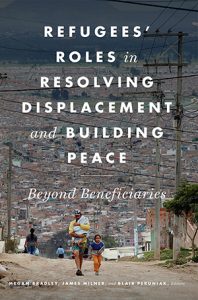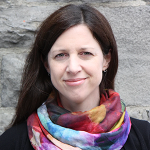Refugees’ Roles in Resolving Displacement and Building Peace: Beyond Beneficiaries

Editor(s): Megan Bradley, James Milner, and Blair Peruniak
Publisher: Georgetown University Press
Year of Publication: 2019
Print Length: 321 pages
Genre: Non-Fiction / Politics, Anthropology, Law, Sociology, Philosophy, Social Science
Area: Colombia, Haiti, Liberia, Mozambique, Tanzania, Uganda
People: Palestinian, The Sahrawis
Topic: Refugees & Forced Migration, Environmental Refugees, Internally Displaced Person (IDP), Refugees’ Roles & Self-Reliance, Protracted Refugee Situations, Peace; Self-Determination, Autonomy, Agency; Reconciliation, Refugee Durable Solution, Refugee Repatriation, Bottom-Up Research, Collaboration & Participation, Social Reconstruction, Solidarity, Root Causes, Disaster, Land & Property, Grief, Victimhood, Human Rights, Humanitarian Action & Humanitarianism, Development, Transformative Justice, Justice, Paternalism, Policy & Practice, Politics & Power, Identity, Intersectionality, War, Civil War
How are refugee crises solved? This has become an urgent question as global displacement rates continue to climb, and refugee situations now persist for years if not decades.
The resolution of displacement and the conflicts that force refugees from their homes is often explained as a top-down process led and controlled by governments and international organizations. This book takes a different approach. Through contributions from scholars working in politics, anthropology, law, sociology and philosophy, and a wide range of case studies, it explores the diverse ways in which refugees themselves interpret, create and pursue solutions to their plight. It investigates the empirical and normative significance of refugees’ engagement as agents in these processes, and their implications for research, policy and practice.
This book speaks both to academic debates and to the broader community of peacebuilding, humanitarian and human rights scholars concerned with the nature and dynamics of agency in contentious political contexts, and identifies insights that can inform policy and practice.
Table of Contents
Foreword — François Crépeau
Acknowledgments
Introduction: Shaping the Struggles of Their Times — Megan Bradley, James Milner and Blair Peruniak
PART 1: Refugees and Resolution Processes: Disciplinary Perspectives
1. Durable Solutions and the Political Action of Refugees — Karen Jacobsen
2. Refugees, Peacebuilding, and the Anthropology of the Good — Cindy Horst
3. Displacement Resolution and “Massively Shared Agency” — Blair Peruniak
4. Transformative Justice and Legal Conscientization: Refugee Participation in Peace Processes, Repatriation, and Reconciliation — Anna Purkey
PART 2: Pursing Peace and Social Reconstruction: Displaced Persons’ Roles
5. Complex Victimhood and Social Reconstruction after War and Displacement — Erin Baines
6. Refugees, Peacebuilding, and Paternalism: Lessons from Mozambique — James Milner
7. Displaced Persons as Symbols of Grievance: Collective Identity, Individual Rights and Durable Solutions — Patrik Johansson
PART 3: Seeking “Solutions” to Displacement within and beyond Traditional Frameworks
8. Shunning Solidarity: Durable Solutions in a Fluid Era — Loren B. Landau
9. “Grabbing” Solutions: Internal Displacement and Post-Disaster Land Occupations in Haiti — Angela Sherwood
10. From IDPs to Victims in Colombia: Reflections on Durable Solutions in the Postconflict Setting — Julieta Lemaitre and Kristin Bergtora Sandvik
11. Refugees’ Roles in Resettlement from Uganda and Tanzania: Agency, Intersectionality, and Relationships — Christina Clark-Kazak and Marnie Jane Thomson
12. Liberian Refugee Protest and the Meaning of Agency — Amanda Coffie
13. From Roots to Rhizomes: Mapping Rhizomatic Strategies in the Sahrawi and Palestinian Protracted Refugee Situations — Elena Fiddian-Qasmiyeh
Conclusion: Where Do We Go from Here? — James Milner, Megan Bradley, and Blair Peruniak
List of References
List of Contributors
Index

Megan Bradley is Associate Professor and William Dawson Scholar in Political Science and International Development Studies at McGill. She began serving as Director of the Institute for the Study of International Development (ISID) in June 2023. Her research and teaching focus on refugees and forced migration, human rights, disasters and humanitarianism. She is the author of books including Refugee Repatriation: Justice, Responsibility and Redress (Cambridge University Press, 2013) and The International Organization for Migration: Commitments, Challenges, Complexities (Routledge, 2020), and co-editor of Refugees’ Roles in Resolving Displacement and Building Peace: Beyond Beneficiaries (Georgetown University Press, 2019) and IOM Unbound? Obligations and Accountability of the International Organization for Migration in an Era of Expansion (Cambridge University Press, 2023). She serves as co-editor of the Journal of Refugee Studies. She was a Fellow with the Brookings Institution Project on Internal Displacement, and has worked with UNHCR, the International Development Research Centre (IDRC), and as the Cadieux-Léger Fellow at Global Affairs Canada.
Source: https://www.mcgill.ca/isid/people-0
More from Megan Bradley in this library, click here.

James Milner is an Associate Professor of Political Science at Carleton University. He is also currently Project Director of LERRN: The Local Engagement Refugee Research Network, a 7-year, SSHRC-funded partnership between researchers and civil society actors primarily in Canada, Jordan, Kenya, Lebanon and Tanzania. He has been a researcher, practitioner and policy advisor on issues relating to the global refugee regime, global refugee policy and the politics of asylum in the global South. In recent years, he has undertaken field research in Burundi, Guinea, Kenya, India, Tanzania and Thailand, and has presented research findings to stakeholders in New York, Geneva, London, Ottawa, Bangkok, Nairobi, Dar es Salaam and elsewhere. He has worked as a Consultant for the United Nations High Commissioner for Refugees (UNHCR) in India, Cameroon, Guinea and its Geneva Headquarters. He is author of Refugees, the State and the Politics of Asylum in Africa (Palgrave Macmillan, 2009), co-author (with Alexander Betts and Gil Loescher) of UNHCR: The Politics and Practice of Refugee Protection (Routledge, 2012), and co-editor of Refugees’ Roles in Resolving Displacement and Building Peace: Beyond Beneficiaries (Georgetown University Press, 2019) and Protracted Refugee Situations: Political, Human Rights and Security Implications (UN University Press, 2008).
Source: https://www.rsc.ox.ac.uk/people/james-milner
More from James Milner in this library, click here.

Blair Peruniak is an Alex Trebek Postdoctoral Fellow in AI and Environmental Justice at University of Ottawa AI + Society Initiative. He received his DPhil. from the University of Oxford (2019) where he was a Social Sciences and Humanities Research Council (SSHRC) Doctoral Fellow at the Refugee Studies Centre. His research focused on politics of asylum and the prospects of democratic institutions of migration governance in liberal states. As an Alex Trebek Postdoctoral Fellow on AI and Environmental Justice, he notably examined the emerging role of AI technologies in temporary labour practices within Canada’s agri-food sector with an emphasis on the political and human rights implications of new surveillance technologies for migrant labourers. Currently, he is a lecturer at McGill University’s Institute for the Study of International Development (ISID) where he teaches on related topics of freedom of movement, human rights, refugee law, and climate change.
Source: https://techlaw.uottawa.ca/aisociety/people/peruniak-blair
More from Blair Peruniak in this library, click here.
